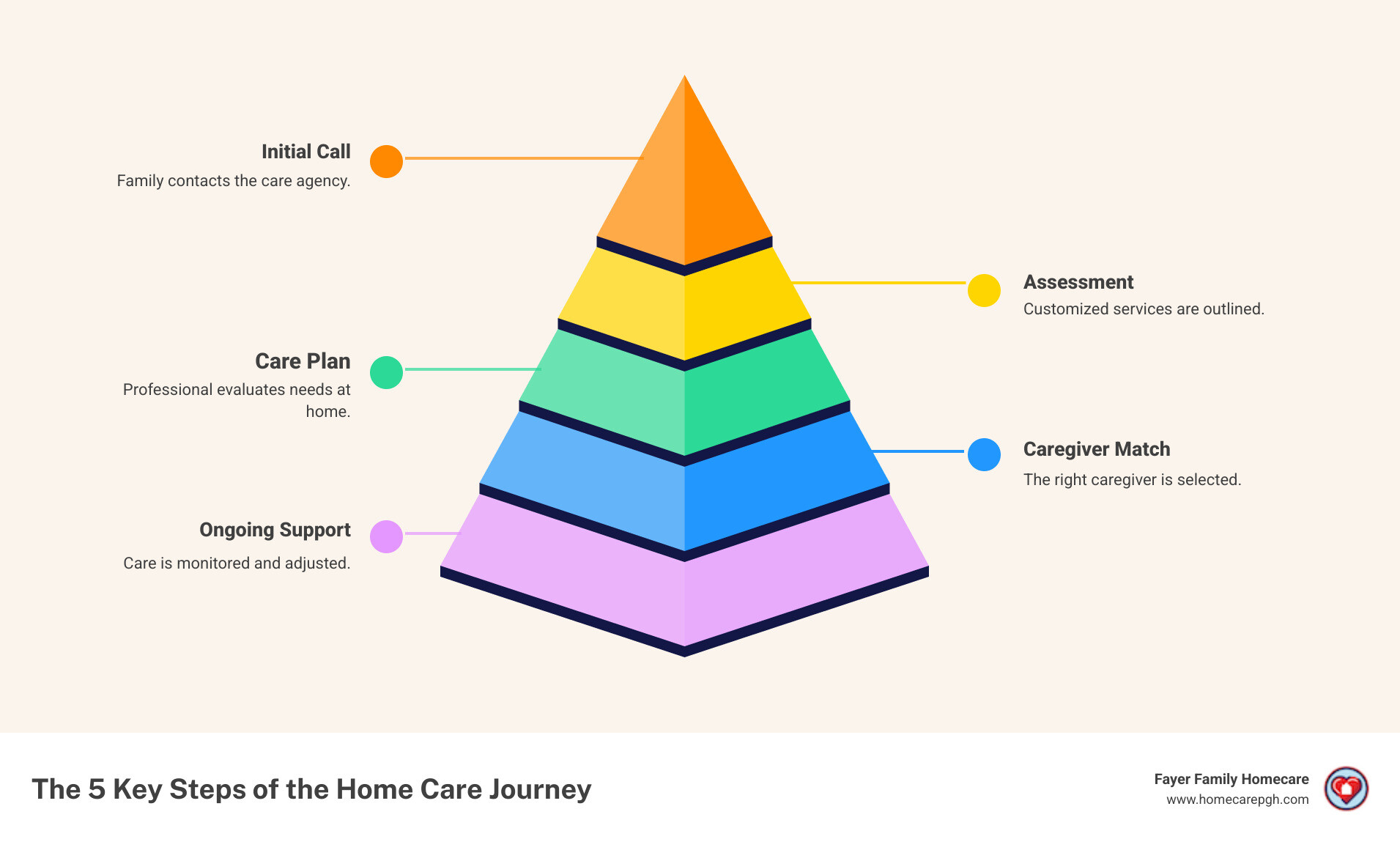
April 3, 2024
The Benefits of House Cleaning Services for SeniorsMaintaining a clean and well-organized living space is more than just a matter of aesthetics; it's a cornerstone of healthy and safe living for seniors.
Read Article
When you're watching your elderly parent struggle with daily tasks or show signs of memory loss, the overwhelming number of care options can leave you feeling lost and anxious. Should they move to assisted living? Do they need full-time care? How do you even begin to make these decisions?
An in home care assessment cuts through this confusion by providing a clear, professional evaluation of exactly what your loved one needs to remain safe and comfortable at home.
With 1.5 million Americans receiving home health care services in 2022 and the 65+ population expected to reach 80 million by 2040, you're not alone in navigating these challenges. The assessment process is designed to be collaborative and supportive - not intimidating.
The goal is simple: create a personalized roadmap that ensures your parent receives the right level of care while maintaining their dignity and independence. Whether they need help with bathing, companionship to combat loneliness, or specialized dementia support, the assessment identifies these needs and matches them with appropriate services.
For families dealing with Alzheimer's or dementia, this evaluation becomes even more critical. It helps identify safety concerns, communication strategies, and the level of supervision needed to keep your loved one secure in familiar surroundings.

Scheduling an in home care assessment can feel uncertain, but it's not a medical exam or a judgment. It's a thoughtful conversation in the comfort of your parent's home. The assessment is the foundation for the care plan, combining your family's insights with professional expertise to create a clear path forward.
The in home care assessment is a roadmap to personalized care. Since no two people are alike, no two care plans should be identical. The goal is to understand individual needs, including what your loved one wants to keep doing, like a morning crossword puzzle or gardening. These details shape how we provide support.
Safety is a partnership, not a restriction. We identify hazards like loose rugs while finding ways to maintain independence. Our article on 5 Ways Home Care Services Can Help Seniors Stay Independent explores this balance.
Matching the right caregiver goes beyond schedules. We consider personality and interests to find a caregiver who truly clicks. For families dealing with dementia or Alzheimer's, the assessment brings peace of mind by creating a professional plan that addresses specific needs and behaviors.
A qualified professional, like a care coordinator, registered nurse, or social worker specializing in senior care, conducts the assessment. Their role is to be a guide and advocate, not an inspector. They listen, observe the environment, and ask thoughtful questions to get a complete picture of daily life.
Most assessments take 40 to 90 minutes, depending on the complexity of needs. We never rush the process. Family involvement is encouraged, as your insights into routines and preferences are invaluable. This is a conversation, not a test; we're simply gathering information to provide the best support.
During the assessment, we systematically explore key areas to get a complete picture of your loved one's needs:
Preparing for an in home care assessment can feel overwhelming, but a little preparation makes the process smoother and less stressful. Like a doctor's appointment, arriving organized with information and questions ensures the conversation is productive and that nothing important is missed.
Having key information ready helps the care coordinator understand the complete picture. Also, note everyday observations not found in medical records, like difficulty hearing the phone or confusion over medications. These details are just as valuable.
Here's what to have on hand:
This is also your chance to interview us. Asking the right questions helps ensure we're the right fit for your family.
For more guidance, our article on Choosing the Right Personal Care Provider: What You Need to Know offers additional insights.
The best care plans honor the individual. Before the assessment, consider what matters most to your loved one:
The more we understand their personality and preferences, the better we can provide supportive care that improves their life at home without being intrusive.
After the in home care assessment is complete, the information gathered is transformed into an actionable plan. This is where we move from understanding needs to providing support that helps your loved one thrive at home.
Developing a care plan is a team effort involving you, your loved one, and our care coordinator. We review the assessment findings together, using your vital insights to set clear, achievable goals. Based on the assessment, we outline which services will be most impactful, from personal care and companionship to specialized Dementia or Alzheimer's support. Our focus is on providing Customized Care.
We work with you to set a realistic schedule for caregiver visits that makes sense for your family's routine. Care plans are not static; they are designed to be flexible and can be adjusted as your loved one's needs change.
The financial side of home care is a common concern. The in home care assessment helps determine the necessary level of care, which directly impacts the cost. Costs are based on the hours of care required, and home care is often more affordable than assisted living.
For families who want to dive deeper, our article on Understanding the Costs and Options in Private Home Care provides comprehensive information.
If you have concerns or disagree with any part of the assessment, we encourage you to speak up. Your first step should be open communication with our agency. A simple conversation can often clear up misunderstandings and lead to adjustments in the care plan.
If you're still not comfortable, you can request a reassessment. A fresh perspective from another professional on our team can be helpful. Unlike some systems with formal appeals, like the process for appealing a decision in certain healthcare contexts, our goal is to resolve concerns through collaboration. Your peace of mind and your loved one's well-being are our top priorities.
Preparing for an in home care assessment brings up many questions. Here are answers to the most common ones to help you feel confident.
Home care adapts to your loved one's exact needs, and the in home care assessment determines which services will make the biggest difference. Services include:
Every service plan is unique. Explore our Personal Care Services for a full list of support options.
Eligibility for private home care isn't based on strict income requirements. It's based on the need for support to live safely and comfortably at home. The in home care assessment focuses on practical needs, including:
For those with dementia or Alzheimer's, eligibility often centers on safety and the need for specialized supervision. If your loved one could benefit from support to remain independent and safe at home, they are likely a good fit.
A care plan must evolve as your loved one's needs change. We stay closely connected with families to ensure our support remains effective.
Ongoing reviews are critical for dementia or Alzheimer's care, as needs can change suddenly. Our goal is to ensure the care is always right for their current situation, helping them thrive at home.
Taking that first step toward getting help for your elderly parent can feel overwhelming, but an in home care assessment transforms that uncertainty into something much more manageable – a clear path forward. Instead of wondering "What if something happens?" or "Are we doing enough?", you'll have a professional roadmap that addresses your loved one's specific needs.
This isn't just about checking boxes on a form. It's about creating a personalized support system that honors your parent's dignity while giving you the peace of mind you deserve. The assessment process recognizes that your loved one is an individual with their own preferences, routines, and dreams for how they want to spend their days.
The beautiful thing about home care is that it meets people where they are – both literally and figuratively. Whether your parent needs someone to chat with over morning coffee, help with bathing and dressing, or specialized support for memory challenges, the assessment identifies exactly what will make the biggest difference in their daily life.
For families in the Greater Pittsburgh Area who are navigating the complexities of Dementia or Alzheimer's care, this process becomes even more valuable. We understand that each person's journey with memory loss is unique, and our experienced caregivers know how to provide the right balance of companionship, supervision, and engaging recreational activities while maintaining the cleanliness and comfort that helps your loved one feel secure.
At Fayer Family Homecare, we don't just provide care – we become part of your family's support network. Our team brings both the professional expertise and genuine warmth needed to help your loved one thrive at home. Learn more about our services and find how personalized home care can bring comfort and confidence back to your family's daily routine.
